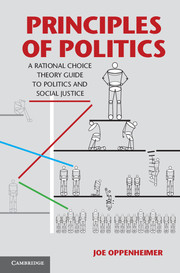Book contents
- Frontmatter
- Contents
- Propositions and Corollaries
- Tables
- Figures
- Sidebars
- Definitions
- Preface
- Overview of the Book
- Acknowledgments
- Introduction: Politics, Universals, Knowledge Claims, and Methods
- Part I The Logic of Collective Action
- Part II Collective Choice
- Part III Political Institutions and Quality Outcomes
- Part IV Social Justice, Choice, and Welfare
- Chapter 8 The General Problem of Collective Welfare and Choice
- Chapter 9 Voting Rules
- Chapter 10 Social Welfare and Social Justice: A Partial Integration
- Conclusions
- Bibliography
- Name Index
- Subject Index
Conclusions
Questions and Lessons
Published online by Cambridge University Press: 05 August 2012
- Frontmatter
- Contents
- Propositions and Corollaries
- Tables
- Figures
- Sidebars
- Definitions
- Preface
- Overview of the Book
- Acknowledgments
- Introduction: Politics, Universals, Knowledge Claims, and Methods
- Part I The Logic of Collective Action
- Part II Collective Choice
- Part III Political Institutions and Quality Outcomes
- Part IV Social Justice, Choice, and Welfare
- Chapter 8 The General Problem of Collective Welfare and Choice
- Chapter 9 Voting Rules
- Chapter 10 Social Welfare and Social Justice: A Partial Integration
- Conclusions
- Bibliography
- Name Index
- Subject Index
Summary
Like medicine and pharmacology, political science is, by its very nature, an applied science. We value its study to improve the political processes of the world so that we might better meet the political challenges which face humanity. And in these early years of the twenty-first century we can easily identify some of these: economic injustice, global warming, wars and other forms of political violence, resource shortages, and regulation of markets to improve their functioning – just to name a few.
Social scientists have developed a set of propositions which appear to be justified and central to an understanding of politics. The foundations on which they rest must continue to be challenged: that is the way of scientific progress. So in these conclusions I briefly address, and partially respond to, three plausible arguments against the theoretical reasoning at the heart of the enterprise of this volume. My response will suggest a research frontier for political scientists who wish to further solidify the gains we have made in understanding politics using rational choice theory.
- Type
- Chapter
- Information
- Principles of PoliticsA Rational Choice Theory Guide to Politics and Social Justice, pp. 245 - 252Publisher: Cambridge University PressPrint publication year: 2012



